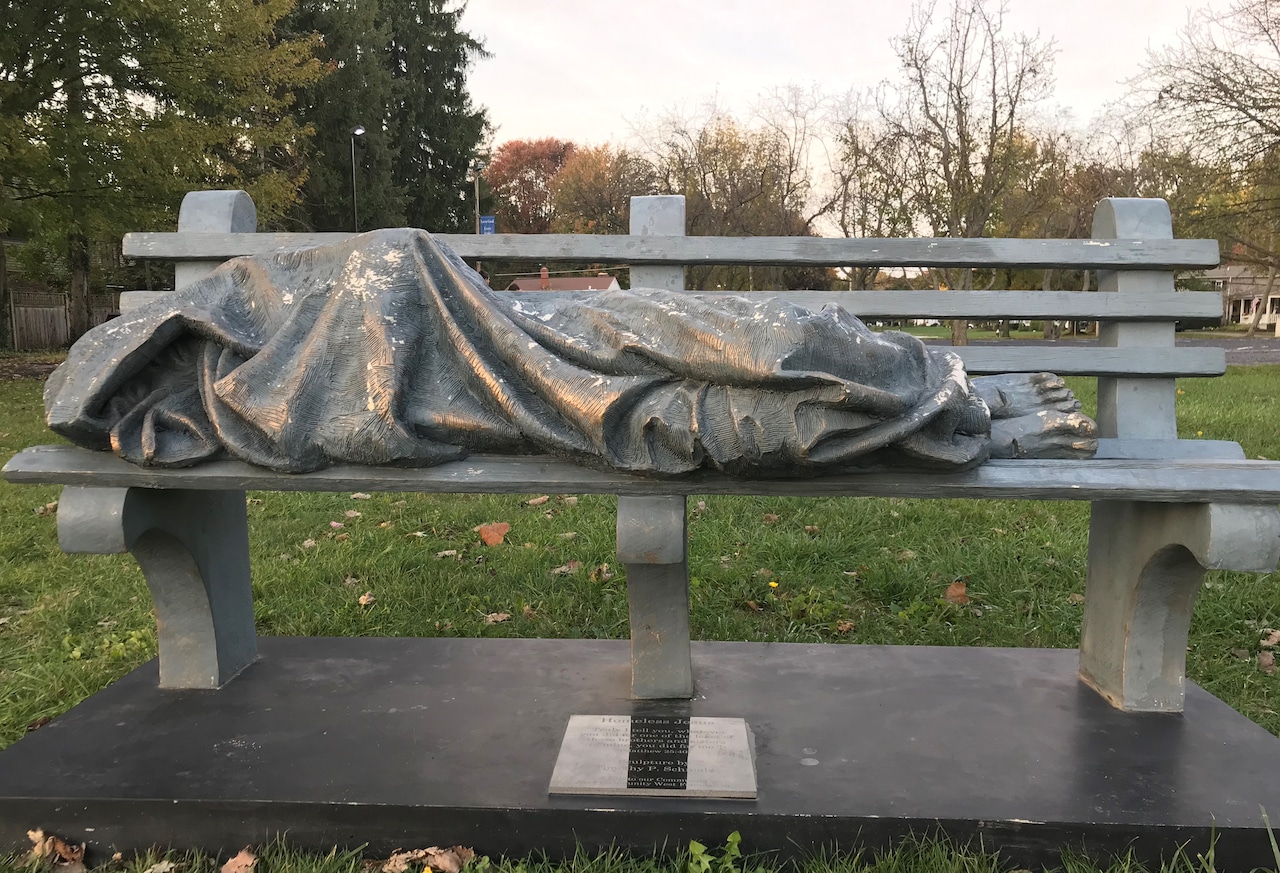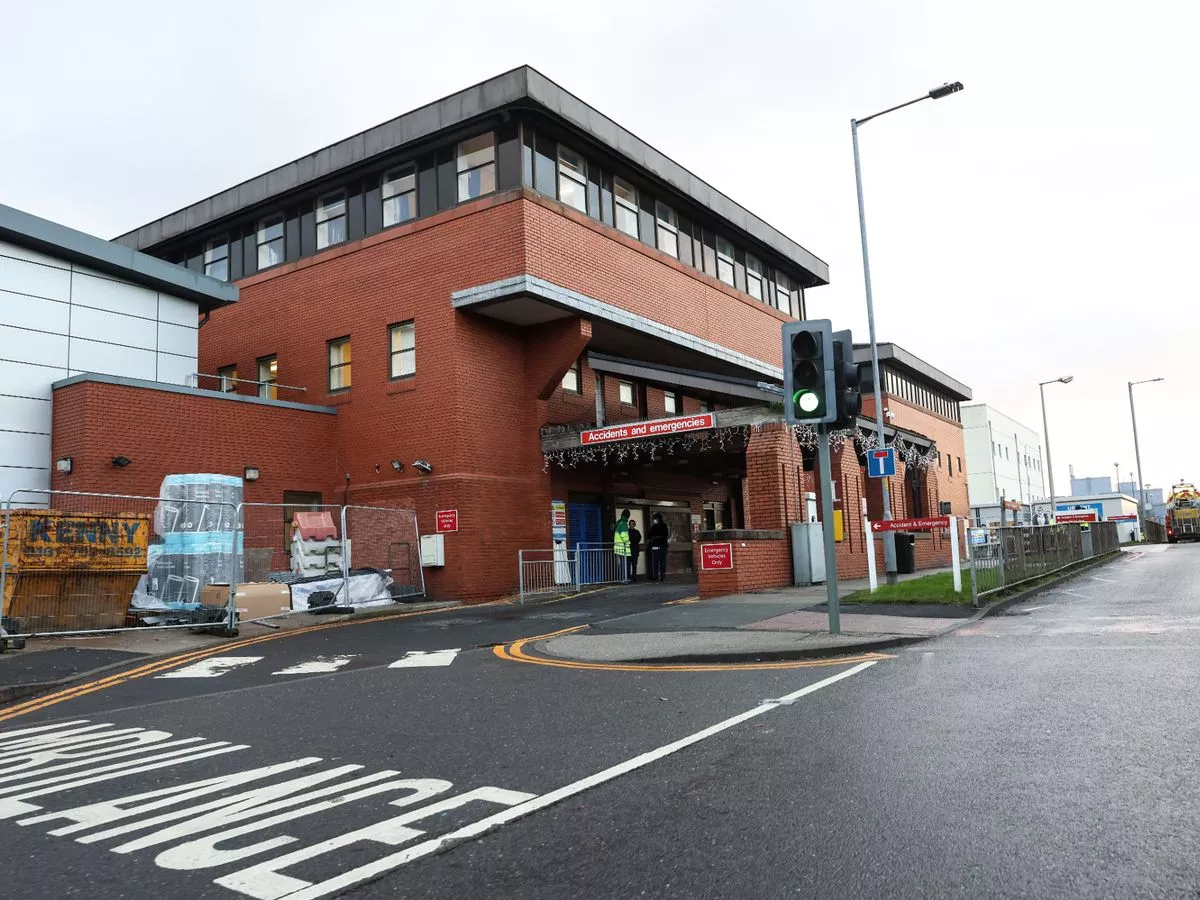
LORAIN, Ohio – Five years ago, a Bay Village resident picking up his daughter from preschool called 911 when he spotted a man, huddled in blankets and asleep on a park bench.
He explained to the dispatcher that he phoned police to “call in a homeless person” because it “doesn’t look good.”
But the person he was referring to was “Homeless Jesus,” a bronze statue of a shrouded man, his bare feet exposed and scarred with crucifixion wounds. It was created to provoke us — to make us pause, look closer and confront our instinct to turn away. And it worked. The 911 call came in within 20 minutes of the statue’s installation. And the story went viral because it revealed something ugly we’d rather deny — when faced with visible poverty, too many of us instinctively reach for exile, not compassion.
Five years later, that reflex is about to become law in Lorain and Rocky River.
Both cities are considering ordinances that would make it a misdemeanor to sleep in public spaces — sidewalks, parks, alleys, even inside a parked car. Police could issue citations, force people to move along and haul repeat offenders into court.
Never mind that someone sleeping in public is generally at their most vulnerable — unprotected, exposed and at greater risk of becoming a victim themselves, rather than victimizing others. And yet, leaders frame these laws as necessary to protect the public and preserve order. They say they don’t want to lock anyone up, they’re just giving officers “tools” to connect people with services.
Set all of those talking points aside, and you’ll be left with your own common sense, and it will tell you this: Poverty itself is the offense.
The U.S. Supreme Court flung this door wide open with its 2024 Grants Pass v. Johnson ruling, blessing cities with the power to punish people for sleeping in public — even when no shelter beds exist. Since then, some Northeast Ohio cities, including Brunswick, Mentor and Ashtabula, have rushed to embrace the punitive route, sweeping people from doorways and park benches without considering the forces that left them there in the first place.
The cities pushing these bans are marching in lockstep with the Trump administration’s new national crackdown — a federal policy that guts the most effective housing policies, rewards cities that ban camping and funnels people into jails or forced treatment. In Washington, D.C., Trump has sent in the National Guard to clear encampments, leaving people to choose between a shelter cot, forced treatment or jail.
His order dismantles proven housing-first strategies, instead reviving the failed logic of punishment and institutionalization. Social service groups across the nation have condemned the policies as cruel, warning that they strip people of dignity while solving nothing.
And that is a fact: These laws do nothing to reduce homelessness, only to erase it from view, punishing people for social conditions we have failed to fix, while saddling them with criminal records, court dates and fines that only tighten their spiral to the very bottom.
Stories by Leila Atassi
Cleveland City Council’s loyalty to itself is a betrayal to the people: Leila Atassi
Three funerals in five months — and Ronayne still calls it ‘public safety’: Leila Atassi
Tell the kids in the homeless shelter ‘trickle-down economics’ is for their own good: Leila Atassi
Ohio protects polluters, not people, from climate costs and crisis: Leila Atassi
If Lorain, Rocky River and the cities that preceded them on this ill-advised path had read the research on these kinds of punitive policies before pitching them to their own communities, they would have understood how destructive they are.
A Johns Hopkins review of national studies found that criminalization of homelessness shortens lives, disrupts care and worsens health. People without housing already die young — on average, at 51 years old. That was the average American life expectancy in 1910. And when researchers examined 100 cities with anti-camping, anti-panhandling and anti-sleeping laws, they found zero evidence that the ordinances reduced homelessness. In some cities, the crisis grew worse.
The city of Cleveland is proving there’s another way. Mayor Justin Bibb’s “A Home for Every Neighbor” program has already housed more than 150 people, closed nearly 50 encampments by working directly with residents and landlords rather than through police sweeps, and offered case managers, groceries, furniture — even pet care.
This strategy reduces the number of police calls, ER visits and court appearances, while creating safer neighborhoods. And only 2% of those approached on the street declined the assistance. It turns out, when people are met with dignity instead of handcuffs, they choose stability.
The city of Houston – the example Cleveland studied when launching its own program – has cut homelessness nearly in half with this model. Bibb’s initiative borrows directly from Houston’s success, proving that scaling housing-first strategies works, not just in sprawling Sunbelt cities but here in Northeast Ohio, too.
I will not deny that neighborhood frustrations are real. So is the fear people feel when they encounter something they don’t quite understand – like a fellow human being who is so marginalized, so forced to the fringes of society that a park bench is the only option for a night of rest. But city leaders in places like Lorain and Rocky River are seizing on those very powerful emotional responses to homelessness and using them to justify laws that punish people just for surviving.
And that brings me back to that provocative statue in Bay Village. “Homeless Jesus” was meant to challenge that visceral, emotional response, to force us to look at the man on the bench and see a human being, not a nuisance.
That 911 call — later lampooned on Saturday Night Live’s Weekend Update, by the way — exposed, in the harshest light, how visible poverty unsettles us, and it widely embarrassed us with our own instincts to shun the marginalized.
Perhaps, since then, we’ve entered a chilling new era, where from the highest levels of power, we’re told it’s not only OK to look away from the most vulnerable, but to erase them altogether, echoing some of the darkest chapters of human history.
Before Lorain and Rocky River adopt their draconian proposals, they should search their souls. Let’s hope they’re guided toward the better path Cleveland has already taken – investing in housing, services and outreach that support the dignity of every person struggling without a home.
Leila Atassi is the editor of the Public Interest and Advocacy team at cleveland.com and The Plain Dealer. She writes a weekly opinion column on state and local issues. You can reach her at latassi@cleveland.com.



